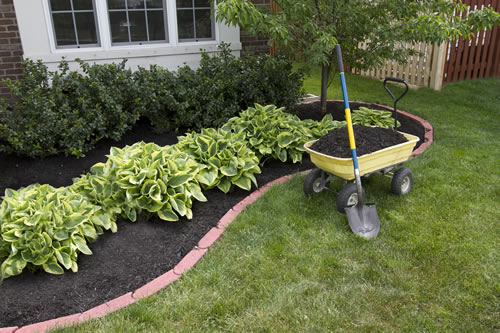
You may know about mulch and their many benefits for your landscape and soil but remain conflicted about the type of mulch to choose for your project. At Mulch-It, we provide a wide variety of mulch types for our community in Atlanta and surrounding areas, but we are also happy to help you select the mulch for your landscape. In this article, we will review some of the common and popular types of mulch to guide you through your selection process. If you have any particular questions or concerns, or if you would like to see, and touch and smell, our selection of mulch, then feel free to visit our site. We are always happy to have you.
What Is Mulch?
In the most basic sense, mulch is any material laid to cover soil. Its benefits range from aesthetics to protection, which we will go over later in the article. The materials used as mulch can be divided into two categories: organic and inorganic. Let’s start with inorganic mulch.
If organic means “derived from living matter,” then you can guess what inorganic mulch is. Inorganic mulch is material that is either man-made or natural but non-decaying. These include rocks, plastics, rubber, and so forth.
Inorganic mulch offers the aesthetic and protective benefits of mulch, but do not offer some of the advanced benefits of organic mulch, which we will describe later. Materials such as rocks, gravel, and rubber come in a variety of inspiring colors to spruce up your landscape, but some can come with chemicals that can be detrimental. These materials do protect the soil from the heat of the summer and the cold of the winter but can sometimes be lackluster. Finally, they can suffocate weed growth, but their weight can also compact the soil if you are not careful.
Wood waste, such as shredded bark and wood, as well as green waste, such as grass clippings and straws, are among the many types of organic mulch. Even newspaper and cardboard are considered organic mulch. In short, materials derived from living matter can be organic mulch. Their defining property is their natural decomposition into beneficial byproducts.
Organic mulch can be as colorful, if not more vibrant, than inorganic mulch as there are many types and colors of organic materials. It also provides the protective benefits, sheltering soil from the harsh cold and scorching heat. By extension, this retains soil moisture, smothers weed growth, and maintains aeration.
The additional benefit of organic mulch is the nutrients they provide for the soil as it decays. Organic mulch breaks down into nitrogen and other nutrients that even encourages earthworms. However, because organic mulch decomposes, it must be replenished regularly.
Come See Our Selection
If you are looking for mulch for your project, then call Mulch-It to learn about our selection. You are also welcomed to visit our site to see, smell, and touch the mulch for yourself. Our representatives and staff are always happy to help. We look forward to having you.